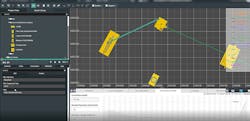Digital tools being deployed to enhance project efficiency, advance first oil
Digitalization is being increasingly embraced by the offshore industry as a key tool that can help it work more efficiently and with a lower carbon footprint. Digital solutions are enabling operators, contractors, and service companies gather more data, analyze it faster, and distribute it more efficiently. This has been especially true in the drilling and production segments of the offshore oil and gas industry.
Recently, Neptune Energy announced that it will deploy Halliburton’s DecisionSpace 365 well construction suite of cloud applications for all drilling and well activities globally, under a three-year agreement. Neptune says that this will create a platform for its digital well program.
Neptune goals include cutting the duration for planning wells from weeks to days; automating engineering calculations; and consolidating data currently held across multiple global locations into one. By consolidating data from the company’s four enterprise data management environments into one system in the cloud, the drilling and wells teams should be able to access all well data from any location, at any time.
Moving to a cloud-based solution, the company added, should allow it to exploit the benefits of artificial intelligence, machine learning and data analytics to address upstream issues and support its overall digital transformation.
Halliburton says that its DecisionSpace 365 cloud applications will allow Neptune to construct digital twins of its wells that plan and track their progress throughout their lifecycle, also modeling opportunities for optimized performance and predicting problems before they occur.
This should also help the company optimize inventories of its plant, personnel, and production resources.
Elsewhere, Bentley Systems reports that Shell’s deepwater business has selected its digital twin solution to streamline its capital projects and accelerate time to first oil. With a plan to deliver several subsea tieback projects over the next 10 years, Shell officials reportedly say they can use the digital solution to advance project delivery and reduce cycle time.
Shell’s GT Ju, General Manager Gulf of Mexico Deepwater Projects, said: “Shell Deepwater Projects is developing an integrated Workflow and Data Platform from system selection to asset handover to streamline our capital projects processes and accelerate time to first oil. The platform is being developed in partnership with Bentley’s iTwin platform. We believe that an end-to-end platform that gives us visibility and transparency to project and engineering data across our portfolio, and that it will be a key driver to delivering competitive projects.”
Meanwhile, oilfield service providers are teaming up with software and computer hardware firms to create other new digital products. In September, Schlumberger, IBM, and Red Hat agreed to collaborate on accelerating the digital transformation across the oil and gas industry. The joint initiative will provide global access to Schlumberger’s exploration and production (E&P) cloud-based environment and cognitive applications by leveraging IBM’s hybrid cloud technology, built on the Red Hat OpenShift container platform.
The companies say that collaborative development will initially focus on two key areas:
• Private, hybrid or multi-cloud deployment of the DELFI cognitive E&P environment enabled by Red Hat OpenShift to expand access for customers
• Delivering the first hybrid cloud implementation of the OSDU data platform (the open data platform for the industry).
And, other alliances have formed on the digital landscape. This past summer, DORIS Group, Schneider Electric, and AVEVA agreed to jointly deliver digital twin technology for the upstream oil and gas sector. The companies aim to offer new solutions to support oil and gas organizations improve the performance of their facilities and maximize return on capital on projects. They will combine their engineering capabilities to provide an asset lifecycle software solution and digital specialization in order to create a fully formed digital twin.
About the Author
Bruce Beaubouef
Managing Editor
Bruce Beaubouef is Managing Editor for Offshore magazine. In that capacity, he plans and oversees content for the magazine; writes features on technologies and trends for the magazine; writes news updates for the website; creates and moderates topical webinars; and creates videos that focus on offshore oil and gas and renewable energies. Beaubouef has been in the oil and gas trade media for 25 years, starting out as Editor of Hart’s Pipeline Digest in 1998. From there, he went on to serve as Associate Editor for Pipe Line and Gas Industry for Gulf Publishing for four years before rejoining Hart Publications as Editor of PipeLine and Gas Technology in 2003. He joined Offshore magazine as Managing Editor in 2010, at that time owned by PennWell Corp. Beaubouef earned his Ph.D. at the University of Houston in 1997, and his dissertation was published in book form by Texas A&M University Press in September 2007 as The Strategic Petroleum Reserve: U.S. Energy Security and Oil Politics, 1975-2005.

